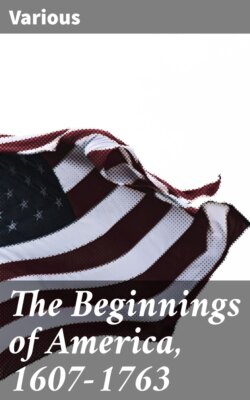Читать книгу The Beginnings of America, 1607-1763 - Various - Страница 6
На сайте Литреса книга снята с продажи.
William Simmonds Describes the Settlers’ Problems
ОглавлениеTable of Contents
The following account of the early days at Jamestown was compiled in London by William Simmonds. It is based on the writings, freely adapted, of several of the colonists who were his friends. As you can see, Simmonds’ friends had no use for Edward Wingfield, the first president of the colony. They were supporters of Captain John Smith, whose own writings begin after this narrative.
Being thus left to our fortunes, within ten days, scarce ten amongst us could either go or well stand, such extreme weakness and sickness oppressed us. And thereat none need marvel, if they consider the cause and reason, which was this: whilst the ships stayed, our allowance of food was somewhat bettered by a daily portion of biscuit which the sailors would pilfer [steal] to sell, give, or exchange with us, for money, sassafras, [or] furs.... But when they departed, there remained neither tavern, beer house, nor place of relief but the common kettle.
Had we been as free from all sins as we were free from gluttony and drunkenness, we might have been canonized for saints. But our president would never have been admitted, for he kept for his private use oatmeal, sack [wine], oil, aqua vitae [brandy], beef, eggs, or what not. [President Wingfield hotly denied this charge.] The [contents of the common] kettle indeed he allowed equally to be distributed, and that was half a pint of wheat and as much barley boiled with water for a man a day. This [grain] having fried some 26 weeks in the ship’s hold contained as many worms as grains, so that we might truly call it rather so much bran than corn.
Our drink was water, our lodging, castles in the air. With this lodging and diet our extreme toil in bearing and planting palisades strained and bruised us. Our continual labor in the extremity of the heat had so weakened us as were cause sufficient to have made us miserable in our native country, or any other place in the world. From May to September those that escaped dying lived upon sturgeon and sea crabs. Fifty in this time we buried. [The original colony numbered 104.]
Then seeing the President’s projects (who all this time had neither felt want nor sickness) to escape these miseries by flight in our pinnace [small sailing boat] so moved our dead spirits that we deposed [removed] him and established [John] Ratcliffe in his place.... But now was all our provision spent, the sturgeon gone, all helps abandoned, each hour expecting the fury of the savages, when God, the patron of all good endeavors, in that desperate extremity, so changed the hearts of the savages that they brought such plenty of their fruits and provision that no man wanted.
And now where some affirmed it was ill done of the Council to send forth men so badly provided, this incontradictable reason will show them plainly they are too ill-advised to nourish such ideas. First, the fault of our going was our own. What could be thought fitting or necessary we had; but what we should find, what we should want, where we should be, we were all ignorant. And supposing to make our passage in two months with victual [food] to live and the advantage of spring to work, we were at sea five months where we spent both our victual and lost the opportunity of the time and season to plant.
Such actions have ever since the world’s beginning been subject to such accidents. Everything of worth is found full of difficulties, but nothing [is] so difficult as to establish a commonwealth so far remote from men and means and where men’s minds are so untoward [unlucky] as neither [to] do well themselves nor to suffer others [to do well]. But to proceed.
The new president, being little beloved, of weak judgment in dangers and less industry in peace, committed the managing of all things abroad to Captain Smith, who, by his own example, good words, and fair promises set some to mow, others to bind thatch, some to build houses, others to thatch them, himself always bearing the greatest task for his own share. In short time he provided most of them lodgings, neglecting any for himself.
This done, seeing the savages’ superfluity [large numbers] begin to decrease, [he] with some of his workmen shipped himself in the shallop [small boat] to search the country for trade.... He went down the river to Kecoughtan [an Indian village] where at first they scorned him as a starved man, yet he so dealt with them that the next day they loaded his boat with corn. And in his return he discovered and kindly traded with the Warascoyks....
And now the winter approaching, the rivers became so covered with swans, geese, ducks, and cranes that we daily feasted with good bread, Virginia peas, pumpkins, and persimmons, fish, fowl, and diverse sorts of wild beasts, ... so that none of our Tuftaffaty [silk-dressed] humorists desired to go for England.
